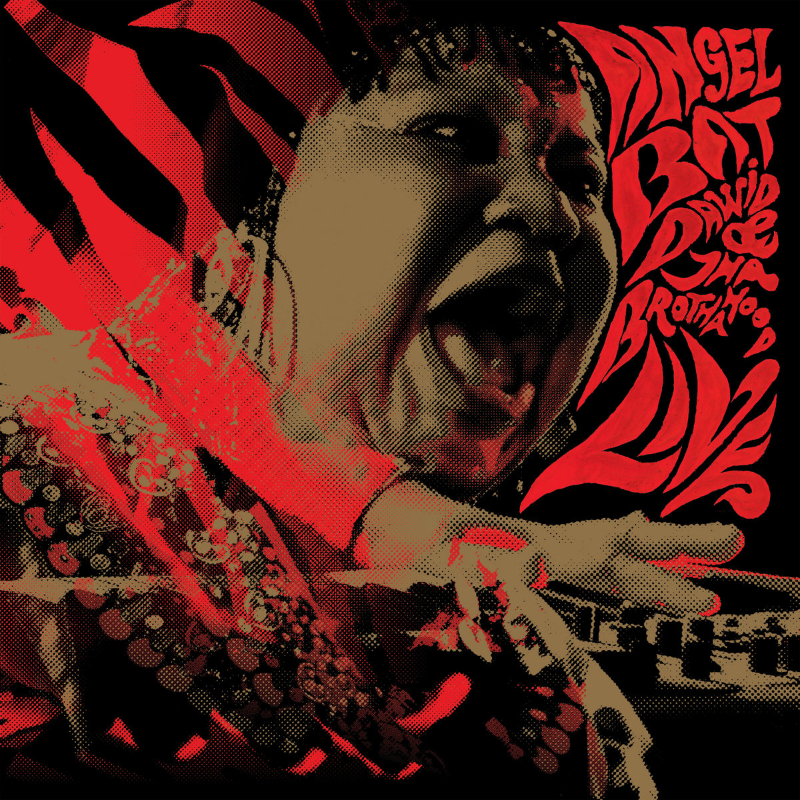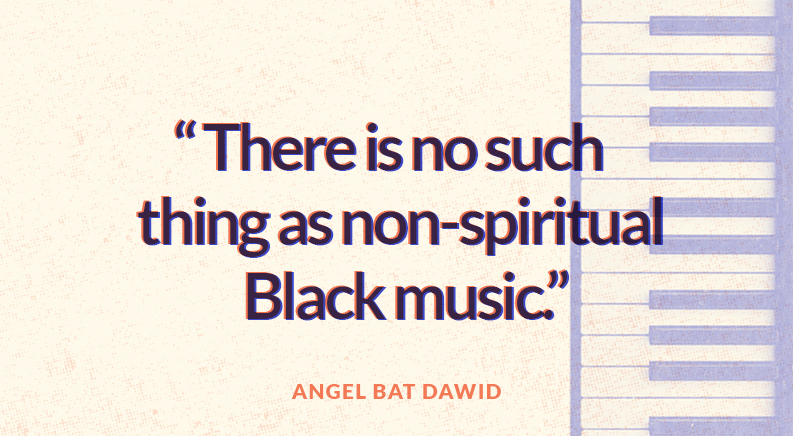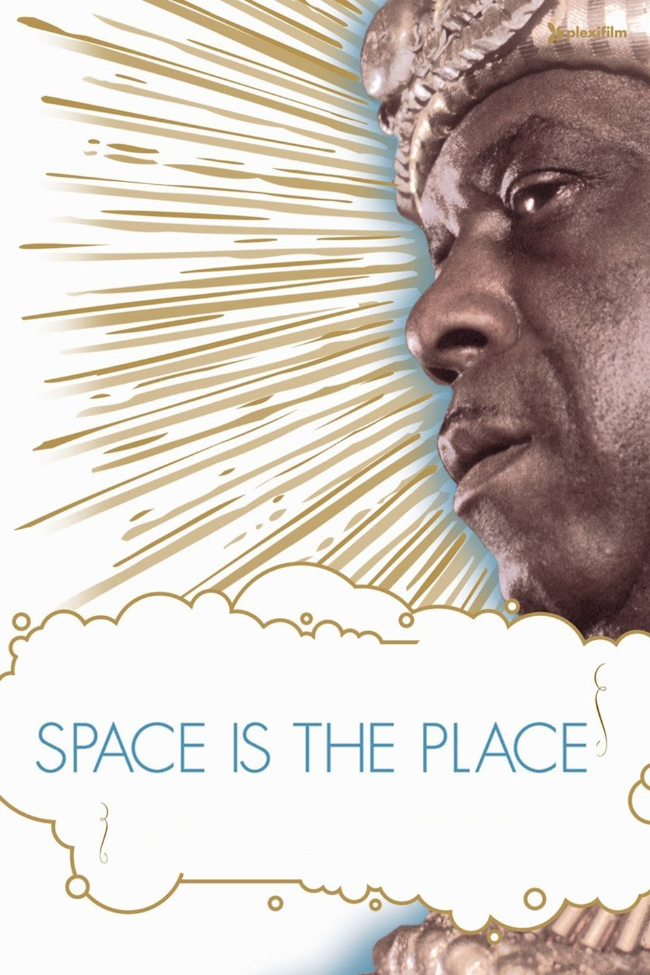Amidst the dearth of in-person performances this year, live albums have provided a special kind of solace. While they may feel like reminders of what we’re all missing, they are also documents of the power of playing and hearing music in a room with other people. The true catharsis of live music is fleeting and no recording can capture that feeling, but it can allow us to meditate and reflect upon an event with context and detachment and that offers its own experience.

Angel Bat Dawid and Tha Brothahood’s Live is a dense and powerful record that rewards reflection. Upon first listening, it’s a recording of a band at the height of their improvisational powers under the leadership of a visionary and charismatic bandleader. Their set draws upon musical history and ritual that ties the music to predecessors such as Sun Ra—whose “Enlightenment” opens the set—and the Art Ensemble of Chicago, and expands upon those influences with far-reaching musical goals. For that experience alone, Live is not to be missed.
But there is a deeper context to this record and the extensive liner notes detail Dawid and Tha Brothahood’s confrontation with institutional racism both before and during the show, which took place at the 2019 Berlin Jazz Festival. The musicians’ experience is very much a piece of the music on Live and Dawid does not accept what she believes to be the status quo among the festival and its audience.
At one point, she pleads with the audience to repeat her words, “The Black family is the strongest institution in the world” to no avail. Dawid explains, “You hear on the album where I’m already kind of mad, and I’m looking in the audience and I’m seeing some people with their arms crossed and their lips shut really tight.” The group responds musically, seeming to gain strength as if empowered by their audience’s complacency, and reach an energetic climax as Dawid shouts, “Affirm my family!”
Dawid brings an energy and spirit that shines through her music to create a powerful and essential document. She told us, “I’m coming from a place of love,” and it’s clear that her love is unmitigated by her experience. In short, Dawid is a force who is not afraid to stand for what she believes in and puts it all into her music.
Growing up both of your parents were missionaries. Do you still have any relationship to playing music in church?
I’ve always been a spiritual musician. My music has never not been connected to my spiritual identity—that’s Black music in general. I always have issues when people say “spiritual jazz.” That term kind of bothers me—jazz is spiritual. There’s no such thing as non-spiritual Black music. Even our crazy music is spirited, there’s no Black music that isn’t tied to spirituality. Now, religion is a whole other thing, it’s separate from spirituality. I grew up in the Baptist church, and I come from seven generations of ministers. The oldest ancestor I know, who was a slave, he was a minister seven generations ago.
After we moved up here [to Chicago, from Louisville], my father was discovering that a lot of things in the Bible talking about Black people really lined up about Black people being descendants of ancient Hebrews. So my parents shifted their belief into being Hebrew Israelites. We started living kosher and we started changing our whole lifestyle. That happened in my teens.

That was transformative because it made me, as a teenager, be like, “What do I really believe? What’s going on with my own belief?” When you’re a kid just going to church because your parents tell you to go, you’re going just to go. It really pushed me into places where I had to really think about what I believed. That was an interesting time. I began to open my mind to a whole lot of things. It wasn’t the easiest road as far as people understanding me.
I study a lot of different things because I like to piece together the whole picture. I like to see everything that’s there. I do think that when Black people get a hold of something, we do things in a certain way. This isn’t about skin color, this is about Blackness. Blackness isn’t tied to a physical thing in my book. I’ve always been interested in what that is. What that means is that in my work, in my music, in order to explore that Blackness, I have to isolate it a lot, which means that I try to play with Black artists most of the time.
It would be hard not to discuss the experience you had in Berlin during the concert that is presented on Live, which is detailed in the liner notes. The story really informs the document of the performance, though the music obviously stands on its own.
That’s really why I put it out. It just so happened to tell that story. I wanted to have a Brothahood album because these are my best friends. I know all the magic we’ve done together and the music we’ve played together for years. When we hit, it just gelled, and it just happened to have this real-time backstory that was happening. As you’re listening, everything was happening in real-time, which is the magic of being spontaneous composers and improvisers.
I had been sitting on this concert for a few months and I hit up International Anthem and I’m so happy. The nature of what happened, I thought they were gonna be like, “Well, Angel, that’s gonna ruffle feathers,” but they were the exact opposite. They had approached some German promoters and said, “Angel’s about to put out this album, there’s a little bit of a thing going on with the Berlin Jazz Fest,” and at first they were hesitant and I think when International Anthem heard their hesitancy, they were like, “We really have to put this out because this is Angel’s experience, this is what happened to her.”
So it just turned into something deeper than just an album, it turned into we’re in this lockdown, now festivals can’t open up, maybe we need to challenge some of the practices that are going on. I’m not trying to say an individual person is racist, but what I can say is that there is a historical traditional context in Europe and with white people all over the world of inadvertently treating Black people like crap.
Speaking of Tha Brothahood, this is your first record with this band.
These musicians I work with are expert musicians, they can listen to anything and play anything. Anywhere I go, they’re like, “We goin’ in, let’s go.”
I’ve had one or two people say, “Angel, why are you always playing with men?” And I sometimes think it’s important for people to see a woman leading an all-male band. Look, there are seven Black men who have never shown me one ounce of misogyny, have never said anything sexist to me. Whenever I say something, they always just go with it, they respect me, and they call me a queen.
I think that’s almost a better example than if I had an all-woman group (and I do have an all woman group now). But I really wanted the world to see a woman bandleader with all Black men. People always want to think of this hyper-misogynistic Black male, toxic masculinity… that’s the key word, “toxic,” but masculinity ain’t toxic.
What is the role of ritual in your music?
A lot of the things I do with these men isn’t just because they’re musicians. They’re all very spiritual in their own way. Viktor [Le Givens] is really an installation artist, he’s interdisciplinary—he can dance, he can sing. We started going to his installations and activating them—it was all about ritual performance, how ritual is so important.
The ritual that I have is that we usually march on stage. This was so challenging in so many places in Europe. I have a service—it’s more like a church service—every show that we have.
Sun Ra’s influence is such a part of this record. You begin the set with his song “Enlightenment.”
It’s one of his most beautiful tunes. The Arkestra is very important to me—I saw Space is the Place when I was about thirteen—my dad had it on VHS. I saw it and I don’t think I’ve ever been the same because I didn’t know music like that existed. I definitely didn’t know that Black people were playing music like that. So you can think of me as a young clarinetist, I’m mostly playing classical music, and we watched Space is the Place.

I really didn’t fit in with my peers, I think because I lived overseas and came back and I was just thinking differently. And, me being very ostracized and bullied as a kid, there was something about watching Sun Ra and listening to the music and I was like, “I feel like there’s something in that that closely reminds me of myself.” I started consciously opening my ears to other forms of music—my dad had all these CDs, from Bob Marley to Jimi Hendrix—and I just wanted to listen to all music, and that was a really conscious decision I made at that time when I saw Space is the Place. You can go to a whole other universe! I didn’t know!
I’ve always had a Sun Ra influence, but I really started making Sun Ra a huge part of my life when I started playing more jazz. I don’t know if you remember when torrents were used, there was this torrent that had all of Sun Ra’s albums, so I downloaded it and it took like ten hours to download. I put everything on repeat and I just let every album play in my house, even when I wasn’t there, so the music was always playing and I was really familiar with Sun Ra.
That seems like a really great way to become familiar with such a large body music.
People think they can learn this Black music—you can’t learn this Black music. Some of this Black music, you can play the notes and it sounds good, but there’s a context: Jazz isn’t just notes on a page, this is the joy and suffering of people that’ve been through a lot. White musicians playing Black music without acknowledging that this is a holy music that comes from a lot of crap, it turns into something else. That’s what my next album explores. There’s a movie called The Cry of Jazz, and I wrote a requiem based off of the text from that film.
Music preserves culture and tradition better than anything, and it’s oral. We live in a world where everything has to be written down in a book. Some of that stuff you can’t write in a book. Some of that stuff, you just have to be Black. Our culture is preserved in that, our heritage is preserved in that, our language is preserved in jazz music and all these genres—I just call them all great Black music because it means it came out of Black people. Hip-hop, gospel—all of that is music that comes from Black people. It’s tied to something deeper than just notes on a page.
